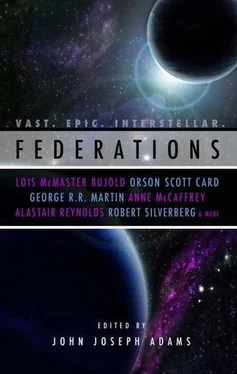“I am sure,” he said quickly, “that the Polity would be most pleased to place representatives of the Empire’s military on as many of your worlds as would be allowed.”
“Excellent!” As far as Gorelkii could ascertain, the human’s expression of delight was sincere. “We would be pleased to engage in cultural and commercial exchanges as well. According to whatever procedures and restrictions your government decides to impose.”
“Yes, well, as I have already mentioned, I am not empowered to negotiate such matters.”
The human’s head moved again, the white growth covering part of his face bobbing with the movement. “I’m positive others can work out the details.” He looked to his colleague. “I think that’s about it, Col.”
“Yes,” the thranx agreed. He eyed the Admiral. “Is there anything else you would like to discuss, your excellency? If you have the time, we would be flattered to invite you to a reception to be given aboard our ship, currently in stationary orbit above this city. You may of course bring with you any relations or friends that you would like. As our food synthesizers are programmed to satisfy the nutritional requirements of many species, I am sure they can create victuals that you would find of culinary interest, srral!k .”
Gorelkii hesitated. The negotiations had gone well. No, amazingly well. Far, far better than even the most pessimistic member of the Polity could have imagined. He considered the thranx’s offer. Refusing an invitation might be construed as an affront. It would be foolish to risk all that had been attained over such a slight request. Besides which he could not deny holding a personal interest in learning as much as he could about these obscenely deferential creatures.
“I accept your invitation.” He indicated the stiff-legged Bardanat. “My Adjutant will handle the details. But I warn you,” he added, “the details of these proceedings have been exhaustively recorded by multiple concealed sources. Any attempt at a future date to alter the terms of surrender will be met with—”
The visitors’ penchant for interruption struck yet again. “Oh, let’s not call it that,” the human insisted. “ ‘Surrender’ is such an unsociable term. I believe the official documents to be agreed upon are titled ‘Instruments of Eternal and Lasting Friendship between the Commonwealth of the Humanx and the Grand and Indivisible Empire of the Three Suns.’ They are already being communicated to your Polity for formal final review and execution.”
Gorelkii tapped his translator. In the course of negotiations he had fully expected to hear the term “execution” employed, but before now, and not in relation to bureaucratic formalities.
“We do have one last request.” The human was eyeing him thoughtfully.
Here it comes , Gorelkii thought. He steeled himself for whatever last-minute ultimate demand might be forthcoming. “Which is?”
Raising a spindly arm, the white-haired human pointed at the Admiral. “Would you wear that magnificent uniform, or whatever you call your current attire, when you attend our reception? I know that all of our military as well as diplomatic people will be as impressed by it as Col and I have been.”
Gorelkii found himself gesturing automatically. “Yes. Yes, that can be arranged.”
“Splendid!” Stepping forward, the human extended his arm once more. This time Gorelkii knew how to respond. They shook hands, gray enveloping beige. As the alien biped retreated, his thranx colleague advanced, dipped his head, and brushed the Admiral’s still extended trio of fingers with his antennae. The contact was negligible.
“We are most grateful for your hospitality,” the hard-shell murmured. “I personally look forward to greeting and entertaining you and your companions on board our vessel.”
Gorelkii sat in silence for a long time after the two Commonwealth diplomats had departed. Only an involuntary and irrepressible grunt of pain from Bardanat reminded the Admiral that his Adjutant was still locked in the ritual pose of Formal Reception.
“Straighten,” he told Bardanat.
“Gratitude, Admiral.” The Adjutant was relieved. “I…” He hesitated, then asked the question that he could not suppress. “It is not for me to determine, but from what I was witness to I am presuming that according to the hopes and expectations of the Polity and of your personal self, the negotiations went well enough?”
“You may presume correctly, Adjutant.” Gorelkii was gazing down the arched Corridor of Mortality through which the diplomats had taken their leave. “There’s just one thing of which I remain uncertain.”
Bardanat stared back at the Grand Admiral, Destroyer of Worlds, etc. “What is that, Excellency?”
Gorelkii looked over at him. “Remind me again: this war. We lost—didn’t we?”
SYMBIONT
by Robert Silverberg
Robert Silverberg—four-time Hugo Award-winner, five-time winner of the Nebula Award, SFWA Grand Master, SF Hall of Fame honoree—is the author of nearly five hundred short stories, nearly hundred-and-fifty novels, and is the editor of in the neighborhood of one hundred anthologies. Among his most famous works are Lord Valentine’s Castle , and the other books and stories in the Majipoor series, but all of his classic works are far too numerous to name.
The idea for “Symbiont”—which Silverberg described in The Collected Stories of Robert Silverberg as a “somber tale of jungle adventure and diabolical revenge”—came from a young woman named Karen Haber that Silverberg met while on a book tour. She gave him the idea, and he worked his magic. Shortly after, the story was finished and appeared in Playboy. And shortly after that, Silverberg married Ms. Haber.
But you shouldn’t let that sweet story fool you; he wasn’t joking when he said this one is diabolical.
Ten years later, when I was long out of the Service and working the turnaround wheel at Betelgeuse Station, Fazio still haunted me. Not that he was dead. Other people get haunted by dead men; I was haunted by a live one. It would have been a lot better for both of us if he had been dead, but as far as I knew Fazio was still alive.
He’d been haunting me a long while. Three or four times a year his little dry thin voice would come out of nowhere and I’d hear him telling me again, “Before we go into that jungle, we got to come to an understanding. If a synsym nails me, Chollie, you kill me right away, hear? None of this shit of calling in the paramedics to clean me out. You just kill me right away. And I’ll do the same for you. Is that a deal?”
This was on a planet called Weinstein in the Servadac system, late in the Second Ovoid War. We were twenty years old and we were volunteers: two dumb kids playing hero. “You bet your ass” is what I told him, not hesitating a second. “Deal. Absolutely.” Then I gave him a big grin and a handclasp and we headed off together on spore-spreading duty.
At the time, I really thought I meant it. Sometimes I still believe that I did.
• • •
Ten years. I could still see the two of us back there on Weinstein, going out to distribute latchenango spores in the enemy-held zone. The planet had been grabbed by the Ovoids early in the war, but we were starting to drive them back from that whole system. Fazio and I were the entire patrol: you get spread pretty thin in galactic warfare. But there was plenty of support force behind us in the hills.
Weinstein was strategically important, God only knows why. Two small continents—both tropical, mostly thick jungle, air like green soup—surrounded by an enormous turbulent ocean: never colonized by Earth, and of no use that anyone had ever successfully explained to me. But the place had once been ours and they had taken it away, and we wanted it back.
Читать дальше












